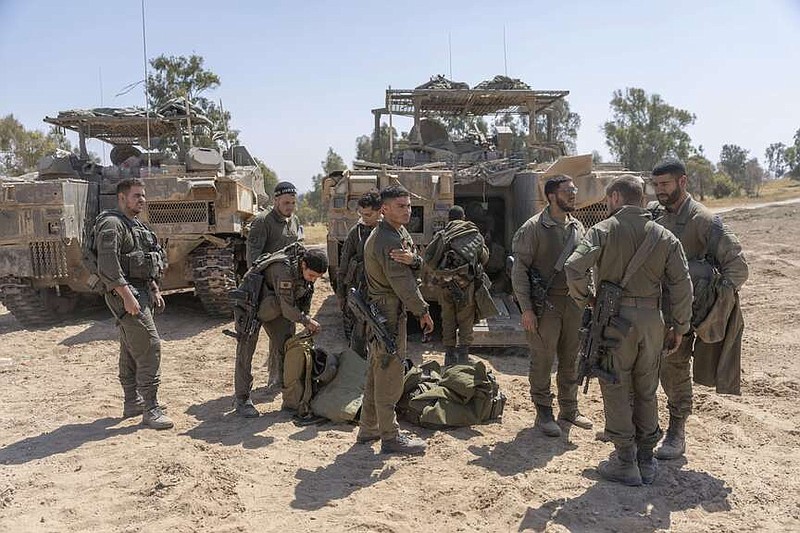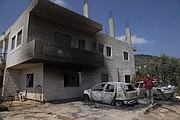DEIR AL-BALAH, Gaza Strip -- The Israeli military renewed warnings on Monday for Palestinians not to return to northern Gaza, a day after witnesses and medical officials said Israeli troops opened fire and killed five people among throngs of displaced residents trying to walk back to their homes in the devastated area.
Hundreds of thousands of Palestinians were driven from the north after Israeli forces first launched their offensive there soon after Hamas' Oct. 7 attack on southern Israel. In the months of fighting since, vast parts of the north have been flattened, including much of Gaza City. After months of Israeli restrictions on aid to the north, some 300,000 who remained there are on the brink of famine, according to the United Nations.
Still, many Palestinians have wanted to go back, saying they are sick of the conditions they endured in displacement. For months, families have been crammed into tent camps, schools-turned-shelters and homes of relatives throughout the south of the Gaza Strip. Some also fear remaining in Rafah, Gaza's southernmost town, as Israel says it plans to attack it eventually to root out Hamas.
Late Monday, Defense Minister Yoav Gallant met with top officials to work on preparations for the Rafah invasion, his office said. The international community, including the United States, has voiced strong objections to the planned offensive, saying it will endanger the estimated 1.4 million Palestinians sheltered in Rafah.
Gallant's office said Monday's meeting included plans for evacuating civilians and expanding deliveries of food and medical equipment to Gaza.
Israel, which has reduced the number of its troops across Gaza, has repeatedly rejected calls to let Palestinians back to the north of the territory, saying Hamas militants continue to operate there. The military says it has loosened the militants' control over the north, but it is still carrying out airstrikes and raids against what it says are reorganizing militants. Last month, Israeli troops raided Gaza's main hospital, Shifa, in two weeks of fighting that left the facility in ruins.
Israeli military spokesperson Avichay Adraee wrote on X, formerly known as Twitter, that Palestinians should stay in southern Gaza because the north is a "dangerous combat zone."
People appeared to be heeding the new warning, especially after Sunday's shootings.
On Sunday, thousands of Palestinians tried going up Gaza's coastal road back to the north, most on foot and some on the backs of donkey carts. Some said they had heard rumors that Israeli troops were allowing people to enter the north.
"We want our homes. We want our lives. We want to return, whether with a truce or without a truce," said Um Nidhal Khatab, who was among those trying to return home.
Several witnesses said Israeli troops opened fire as the crowds neared checkpoints at Wadi Gaza, the line that the military has drawn separating northern Gaza from the rest of the territory. Five people were killed and 54 wounded, according to officials at nearby Awda Hospital in central Gaza, where the casualties were brought.
The Israeli military had no immediate comment. It was not clear what triggered the shooting.
response Options Weighed
Israel is also planning a response to Iran's weekend attack. On Monday, Israel's military chief said that his country will respond to the attack, but he did not elaborate on when and how as world leaders urged against retaliation, trying to avoid a spiral of violence in the Middle East.
The Iranian attack on Saturday came in response to a suspected Israeli strike two weeks earlier on an Iranian consular building in the Syrian capital of Damascus that killed two Iranian generals. It marked the first time Iran has launched a direct military assault on Israel despite decades of enmity dating back to the country's 1979 Islamic Revolution.
Iran launched hundreds of drones, ballistic missiles and cruise missiles at Israel in the attack. The Israeli military said that 99% of the drones and missiles were intercepted, by Israel's own air defenses and warplanes and in coordination with a U.S.-led coalition of partners.
Israeli military chief Lt. Gen. Herzi Halevi said Monday that Israel is considering its next steps but that the Iranian strike "will be met with a response."
Halevi gave no details. The army's spokesperson, Rear Adm. Daniel Hagari, said Israel will respond "at the time that we choose."
Both men spoke at the Nevatim air base in southern Israel, which Hagari said suffered only light damage in the Iranian attack.
Prime Minister Benjamin Netanyahu has been huddling with top officials to discuss a possible response. For a second straight day, the government made no announcements on any decisions.
In a conversation with U.S. House Majority Leader Steve Scalise, Netanyahu said that "Israel will do whatever is required to defend itself," the prime minister's office announced.
While Israeli leaders have hinted at retaliation, the government is under heavy international pressure not to further escalate the conflict -- especially after the Iranian strike caused such little damage.
The U.S. has urged Israel to show restraint as it seeks to build a broad diplomatic response.
While Maj. Gen. Pat Ryder, Pentagon press secretary, said any response is up to Israel to decide, he added: "We don't want to see escalation, but we obviously will take necessary measures to protect our forces in the region."
Pressed at a briefing about whether such a response would jeopardize stability in the region, Ryder said the U.S. will "stay in close consultation with our Israeli partners, as we have done throughout the weekend. Again, we don't seek wider regional conflict."
Information for this article was contributed by Wafaa Shurafa, Samy Magdy, Lolita C. Baldor and Josef Federman of The Associated Press.

